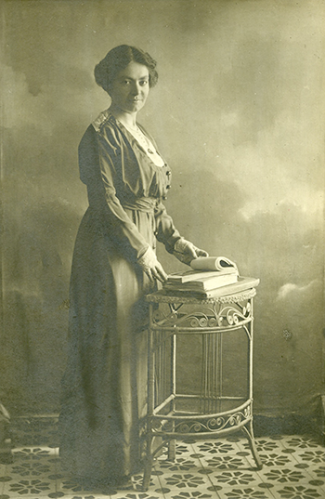Hadassah
Inside Look
Nursing Zionism: Rae Landy and Hadassah in the Holy Land

Cleveland-born author Debbi Perkul grew up steeped in the family lore surrounding her great-great-aunt, Rae Landy. She also grew up an avid reader of action adventure stories featuring strong, intrepid heroines. It didn’t take long—just until graduate school—for Perkul to connect the two; she wrote her master’s thesis on Landy, one of the two original nurses sent by Hadassah in 1913 to Jerusalem. Ten years later and after significant further research, Perkul has published Winds Over Jerusalem, which she describes in her introduction as “a memorial to a great woman who never had children, who has no direct descendants to remember her, to say Kaddish for her, to mourn her or to celebrate her life.”
From 1913 to 1915, Landy, along with fellow nurse Rose Kaplan, lived in Jerusalem among the bustle, the poverty, the burgeoning Zionism and the outbreak of World War I, all the while administering to the sick and sending regular reports of her life and work back to Henrietta Szold in New York. Members of Hadassah—which had just been founded in 1912—were kept informed of the nurses’ activities through the organization’s bulletin, which years later evolved into the very magazine you are reading.
Perkul’s research into her aunt’s career elicited a deeper understanding of the power of nursing. “She was like many women in nursing at that time,” writes Perkul, “who viewed their profession as a calling and dedicated all their energy to a higher mission, channeling their passion into their careers.” One might add that in the case of Landy, her work on behalf of Hadassah represented her best self in her commitment to patient care as well as Zionism, which she ardently supported.
Even before Hadassah officially opened the first nursing school in pre-state Israel in 1918—a centennial that will be celebrated next year—Landy was informally spreading the gospel of nursing to eager young women in Jerusalem. In 1915, against the backdrop of severe food and money shortages brought on by the war and operating alone after Kaplan had returned to New York City, an industrious Landy nevertheless began instruction in nursing. As Perkul writes:
While all this political activity was swirling around her, Rae continued to find additional things to do to occupy her time and keep her mind on her mission. She couldn’t bring food to the city, which was what people really needed, but she could provide other services that might be helpful. One initiative she was particularly proud of was the formation of a new home nursing and hygiene class in the Evelina de Rothschild School. The class met each Thursday morning and, although she was only able to recruit seven teenage girls, she wrote cheerfully, “small classes are always better.”
She taught the girls how to make beds with and without patients in them and how to lift patients who couldn’t move themselves. She demonstrated how to give a sponge bath by bathing one of the girls. The students must have felt very professional when they were taught how to wrap bandages around various parts of the body and learned to use linseed poultices, mustard pastes and foot baths. In her next letter to New York, Rae wrote, “I find these classes very interesting…. The girls are very clever and enjoy the classes very much.”
To learn more about Winds Over Jerusalem and its author, visit debbiperkul.com.











 Facebook
Facebook Instagram
Instagram Twitter
Twitter
Marlene Bluestone Suliteanu says
Impressive: must have taken tedious (and comprehensive) research!
Are there more such, about other historical figures, in Debbie Perkul’s future?